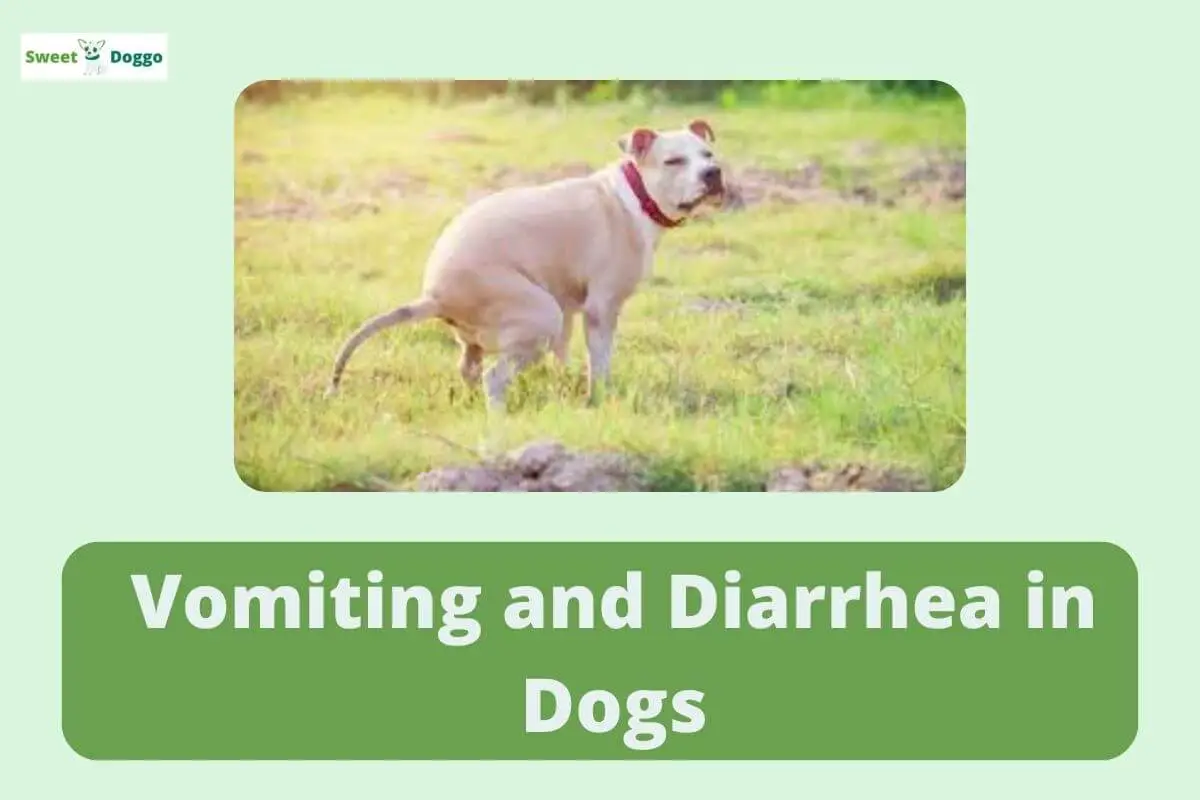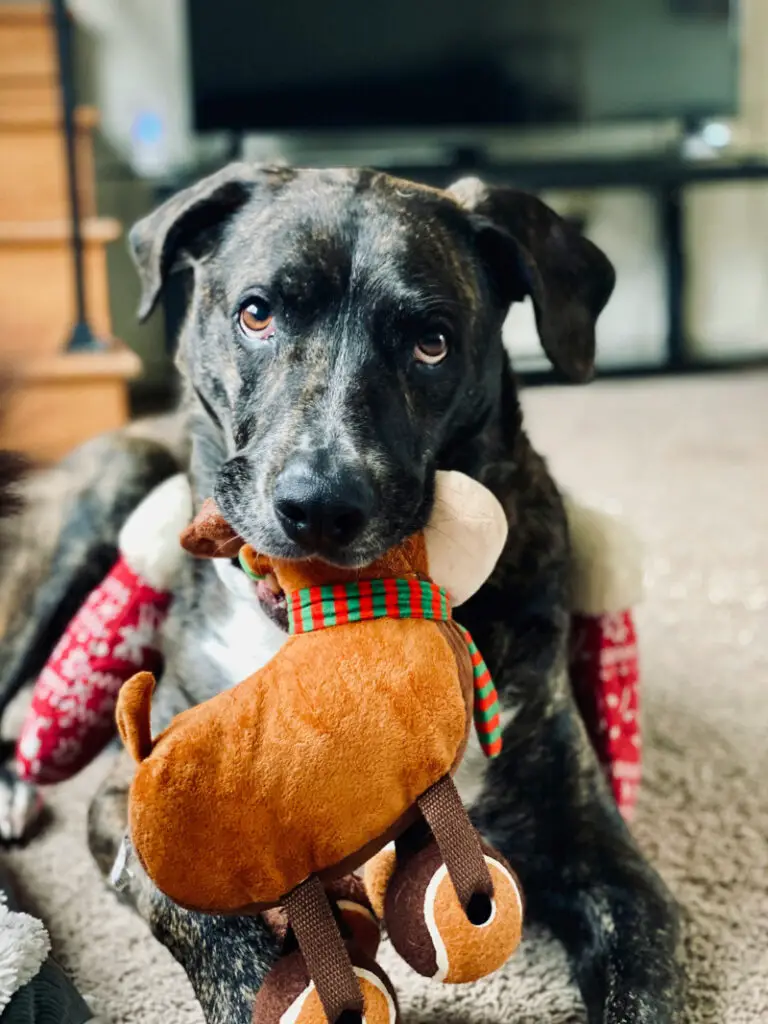Just like us, dogs can experience all kinds of stomach problems. That a dog has diarrhea and vomiting is not an unusual event; however, it should never be taken lightly, especially if these symptoms persist for more than 24 hours.
Generally, the presence of vomiting and diarrhea in dogs indicates that the pet has eaten something inappropriate, but it can also be due to more serious causes in some cases.
Does your dog have vomiting and his stools are very loose or liquid? You don’t know what to do or what you can give him? Although it is important to consult the veterinarian, here is an informative summary of the possible causes, alarm symptoms, home treatment, prevention measures, recommended diet… and more.
Note. During the writing of this article, different sources specialized in veterinary medicine were consulted, including the PetMD and the Merck Veterinary Manual.
Table of Contents
Vomiting and diarrhea in dogs
As an owner, it is important that you understand, in broad strokes, how your dog’s digestive system works, since the canine digestive system is very different from that of humans.
First of all, the shape of our jaw and saliva causes the breakdown of food to start once it enters the mouth. In the case of dogs, the mouth is designed to crush and tear, while the main function of saliva is to kill bacteria, not break down food.
This is why they can eat raw meat and other foods that would send the vast majority of people to the hospital.
Most canine digestion occurs in the stomach, where food is received in chunks. Dog stomach acids are about 3 times more potent than the stomach acid of the average human, hence they can break down food that has been swallowed almost whole. Even so, food can take about 10 hours to digest on its way from the mouth to the colon.
When the dog has eaten an indigestible or unwanted material, vomiting is normal. This is the natural instinct of animals to empty their stomachs and prevent a harmful substance from getting further into their system. The same response can occur if the gastrointestinal tract is irritated or there is any type of colonic stimulation.
Diarrhea, on the other hand, occurs when unwanted material makes its way completely through the dog’s digestive system.
Now, dog diarrhea and vomiting at the same time may be due to more than just indigestion.
Common causes of vomiting and diarrhea in dogs (less serious)
Your puppy may become temporarily sick with diarrhea and vomiting due to:
1. Indigestion or reaction to certain foods
The pet may have trouble digesting a meal, especially if there have been changes in its usual diet. This can upset his intestinal tract, resulting in an acute episode of vomiting and diarrhea. Despite these symptoms, your dog may continue to act normally.
When making dietary changes, be sure to do so gradually to prevent indigestion and imbalance of intestinal bacterial flora.
2. Ingestion of toxic substances
If your dog suddenly has diarrhea and vomiting after spending a normal day outside, it may be due to his irresistible urge to rummage through the garbage. It is well known that dogs tend to eat almost anything that comes their way, from spoiled food and medicines to chemicals and poisonous plants.
Vomiting and diarrhea are often the first signs of poisoning and may include traces of blood.
3. Infections
Infections, bacterial or viral, can cause chronic vomiting and diarrhea, hence the importance of going to the vet if you suspect this cause.
They tend to be more common in puppies and young dogs, for example after ingesting raw meat in poor condition, poorly cooked meat, contaminated vegetables, or due to contagion with viral diseases such as parvovirus, rotavirus, coronavirus, distemper, among others.
4. Parasites
Intestinal parasites can also cause your pet to vomit and have diarrhea. Whipworms, roundworms, tapeworms, and other parasites often trigger these symptoms, as well as general gastrointestinal upset.
5. Medication side effects
Several medications can cause diarrhea and vomiting in dogs among their side effects. These include nonsteroidal anti-inflammatory drugs (NSAIDs) and NMDA receptor blockers (often used as anesthetics in animals).
6. Stress and anxiety
Another common cause of why dogs experience diarrhea accompanied by vomiting is stress. Just like people, a very stressed or anxious dog can suffer from stomach problems. Avoid inappropriate punishments, long periods of time without human company, and stressful situations at home.
More serious causes of diarrhea and vomiting in dogs
Among the most serious and rare causes of vomiting with diarrhea in dogs are:
1. Allergic reactions
The presence of additional allergy-type symptoms, such as watery eyes, sneezing, or paw biting, may indicate that the pet has an allergy. It could be due to something you have eaten or something you have been in contact with.
Sometimes an allergic reaction can be mild and go away on its own, but it’s best to see your vet if one is suspected.
2. Inflammatory bowel disease
This condition can occur if inflammatory cells chronically invade the dog’s intestine. Typically, the pet vomits and has frequent diarrhea, which may contain mucus and traces of blood. In addition to weight loss, those would be the main symptoms.
The disease is fatal in some dogs, which is why it is so important to diagnose it early.
3. Bowel obstruction
Obstruction or twisting of the intestines is a serious cause of watery diarrhea and vomiting in dogs. The pet should be seen as soon as possible by a veterinarian.
4. Organ failure
Liver or kidney disease can lead to failure of the liver or kidneys, a serious condition in which the dog experiences concurrent diarrhea and vomiting. This is usually more prevalent in older dogs. Other health problems, such as diabetes and pancreatic disease, can also be characterized by symptoms of vomiting and diarrhea.
It is normal for a dog to have occasional episodes of diarrhea and vomiting throughout his life. When they arise sporadically, these symptoms are usually nothing to worry about.
But if you notice that your dog is vomiting and has frequent diarrhea, stays the same or seems to have gotten worse after 24 hours, or starts showing other abnormal signs like vomiting and diarrhea with blood, then don’t hesitate to contact your vet. Your lovely pet could use some help.
What other symptoms could my dog have besides diarrhea and vomiting?
Depending on the cause in question, the dog may present the following:
- Vomiting and bloody diarrhea
- Vomiting and diarrhea with mucus
- Increased volume of loose stools
- Fatigue, fever, and weakness
- Loss of appetite
- Mood swings and lethargy
- An obvious effort to empty the intestines
- Abdominal pain
What to do if my dog is vomiting and has diarrhea?
The problem will most likely resolve itself if the pet:
- Vomit one time
- He has not had large-volume diarrhea
- Start eating normally
- Act playful
- He has a normal bowel movement after a few hours
Starting from the fact that the specific treatment always depends on the cause, and that in the presence of constant symptoms it is best to consult the veterinarian, here are some of the actions you can take to treat your dog at home.
If you have identified a potential cause, such as exposure to litter, a change in diet, or ingestion of an ornamental plant, take immediate action to eliminate the cause and prevent further exposure.
Measurements at home
Has the dog already had several diarrheas and vomiting, and you can’t take it to the vet right away?
Consider the following:
- You should not give him any medication without first consulting the veterinarian. Some common medications can be toxic, hence worsening the animal’s condition.
- According to the general guidelines for the treatment of both symptoms, it is recommended to suspend food for 2-4 hours in relation to vomiting, and even 24 hours in the case of diarrhea.
- Keeping these indications in mind and evaluating the general condition of your dog, suspend feeding for several hours (4 to 6) to give his digestive system a rest. If after that time the pet seems sick, lethargic, or diarrhea and vomiting continue, consult the veterinarian.
- After a few hours without vomiting, you can offer small amounts of water (a few tablespoons) every 20 minutes or so, until the pet is hydrated. Don’t let him drink too much water at once, as this can cause vomiting to return.
- They no longer vomit and seem to have responded well to water. Then you can offer him a soft diet, in small and frequent portions. A good recommendation is to provide a homemade diet, including white rice and boiled potatoes as a source of carbohydrates, and boiled boneless chicken as a source of protein. This soft diet should be maintained for 2 days.
- Taking the dog out for a walk allows you to better observe how his bowel movements and urination are behaving, as well as any additional vomiting.
- Is the dog vomiting and having diarrhea with blood? If these symptoms worsen over time, or other abnormal symptoms arise, see your vet immediately.
Recommended:
- Does your dog have vomiting? Causes, Types of Vomiting, and Treatment
- What to Give a Dog with Diarrhea?
Dog vomiting and diarrhea treatment
Depending on the cause and intensity of the symptoms, the veterinarian may recommend the administration of antidiarrheal and antiemetic medications. This includes bismuth subsalicylate and famotidine. Both are often available as over-the-counter digestive medications and are very effective at calming the stomach, reducing heartburn, preventing vomiting, and hardening stools.
The most commonly used dose of oral famotidine (Pepcid) to treat vomiting diarrhea in dogs is 0.25 – 0.5 mg per pound (0.5 to 1.0 mg/kg) every 12 or 24 hours. A 20-pound dog should receive approximately 5 to 10 mg of famotidine (full dose), 1 to 2 times daily. It is often used for 3-5 days.
In the case of bismuth subsalicylate (Pepto-Bismol), the typical daily dose for dogs is approximately 2 teaspoons per 10 pounds (10 mL total), ideally divided into 2-4 mini-doses. It is often used for 1 or 2 days. Note: Never use on cats.
While these medications are considered safe for treating and relieving sudden diarrhea and vomiting in dogs, including puppies, their use should always be supervised by a veterinarian. He can determine the most appropriate medication and what dose your dog needs. He may also recommend hospitalization to give your sweet doggo IV fluids.
Dog diarrhea and vomiting home remedy
In general, the first measure or remedy that you can adopt for a dog with diarrhea and vomiting is temporary fasting. If the symptoms are due to a common cause, such as indigestion, simply not overloading the digestive system can help.
Home remedies worth considering
- Maintain a cool and comfortable temperature in the home. It is not recommended to keep the dog in a very hot environment, as this can worsen dehydration caused by diarrhea and vomiting. If the condition of the pet allows it, they can take short walks in the fresh air, but it is best to keep it indoors, especially if the weather is hot.
- Once you have started the water administration, you can give small sips of water mixed with a pinch of baking soda every 1 to 2 hours. This is a simple remedy that helps calm and neutralizes stomach acids. Note: Baking soda is considered safe for dogs as long as it is not consumed in large amounts.
- Many people say that chamomile and ginger infusions also serve to relieve the dog that has vomiting and diarrhea. You can give small sips of these teas after you have started to reintroduce fluids.
- Prepare a bland homemade diet that is manageable for your dog’s digestive system. Foods such as rice, pumpkin, and sweet potato are not only easy to digest, but also provide the amount of fiber necessary to remove toxins, without overloading the digestive function.
- The administration of probiotics favors the good digestion of food and helps to repopulate the intestine with healthy bacteria. These are usually available in capsules, so you can dilute them in water or give them with food. Although the use of human probiotic supplements does not appear to be harmful to dogs, it is always recommended to use a product designed specifically for canine use.
How can I prevent these symptoms?
Although some of the causes of canine diarrhea and vomiting cannot be prevented, there are several steps you can take to prevent your dog from having episodes of this type. For example:
- Monitor his diet and make sure he only eats dog food, rather than human food.
When introducing a new food, do it gradually to avoid upset stomach and intestinal irritation. - Always provide a high-quality diet that contains all the vitamins and nutrients your body needs. Avoid giving your dog bones.
- Don’t let your dog rummage through the garbage. Keep a close eye on him when you go out for a walk to prevent him from ingesting foreign material. Some owners choose to use a basket muzzle to keep their dog’s mouth closed.
- Keeping it away from harsh environments, such as heavily soiled areas, helps prevent flea, tick, and parasite infections.
- Make sure that the pet lives in a healthy and safe environment, free of toxic substances within its reach.
- Do not provide toys that can be easily chewed or swallowed. This is a frequent cause of diarrhea and vomiting due to gastrointestinal irritation.
- Avoid yelling, fighting, and other situations that may be stressful for your doggy.
- Follow the vaccination plan and take him to the vet regularly. Routine check-ups are essential to diagnose possible illnesses in a timely manner.




